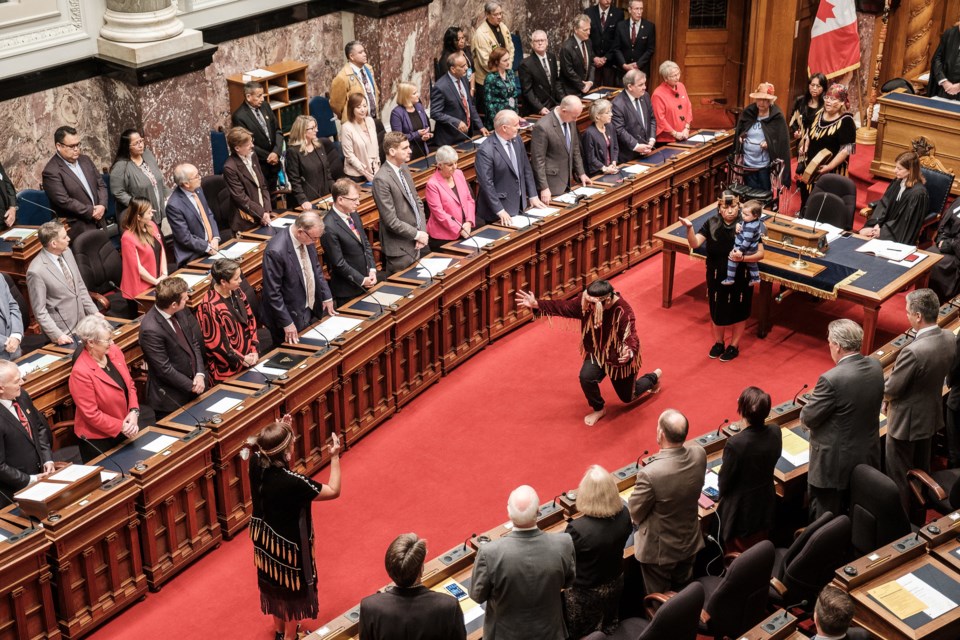B.C. First Nations leaders have ramped up their attacks on the government’s new bill to fast-track infrastructure, saying the New Democratic party responsible for UNDRIP has utterly failed to consult them before tabling sweeping changes in the legislature.
The BC Assembly of First Nation, First Nations Summit and Union of BC Indian Chiefs issued a joint call Tuesday for the government to , the Infrastructure Projects Act, that would let cabinet craft new environmental assessment processes, automatically issue permits and speed up construction on everything from mines to mills, power plants, schools, hospitals and more.
“Bill 15 is overreaching and enables the province to bypass permitting processes and expedite environmental assessment for any project they deem a priority,” BCAFN Regional Chief Terry Teegee said in a statement Tuesday.
“The province is ramming through Bill 15 without any First Nations input who stand to be adversely impacted. This law may breach constitutional consultation requirements and is not consistent with the [United Nations Declaration on the Rights of Indigenous Peoples].”
Eby unveiled the legislation last Thursday. He said the changes would help him clear bureaucratic delays and permitting holdups by allowing cabinet to designate certain projects as provincially significant and then override environmental assessments and local municipalities to get them built.
Eby cited the spectre of economic uncertainty caused by U.S. President Donald Trump as rationale for the changes.
Typically, the government would consult with First Nations organizations on legislation, as well as include them in the process of co-developing the bill. Both are key parts of the Declaration on the Rights of Indigenous Peoples Act (DRIPA) passed in 2019.
In this case, though, Indigenous leaders say that didn’t happen.
“In developing Bill 15 the province conducted no meaningful consultation and co-operation with First Nations, and did not adhere to its own interim approach on the alignment of laws,” said Grand Chief Stewart Phillip of the Union of BC Indian Chiefs.
“We are deeply alarmed by the province’s continued backsliding on reconciliation.”
Infrastructure Minister Bowinn Ma said her government consulted with its internal declaration act secretariat and determined that, due to short timelines, it was better to have the bulk of the consultation after the legislation passed and once government began crafting the detailed regulations.
“I acknowledge Bill 15 was expedited legislation,” Ma said in an interview. “There was a shorter process to consultation than we would have liked to have.”
Ma said the government remains committed to DRIPA, and despite concerns, said nothing in the legislation will allow cabinet to overrule Indigenous rights.
“It was always our intention to deal with redundancies and bureaucratic red tape, not to somehow degrade our environmental standards or our commitment to DRIPA,” said Ma.
The premier has expressed frustration at provincial and municipal delays on housing, schools, hospitals, mines, hydrogen facilities and other projects he said are good for the economy and British Columbians. He cited the case of a new school held up for more than a year due to permitting over a ditch on the property.
But reconciliation should not be bypassed for expediency, the chiefs reminded Eby in their open letter Tuesday.
“Reconciliation and economic growth are not incompatible, they go hand in hand,” said Robert Phillips of the First Nations Summit.
“If the province chooses to neglect the former in a misguided attempt to advance the latter, it will quickly find itself mired in legal proceedings that benefit absolutely no one.”
Bill 15 is the government’s second attempt to consolidate extraordinary power into cabinet, at the expense of existing laws and the legislature.
In March, also citing Trump, the government tabled Bill 7, which would have allowed cabinet to bypass the legislature for two years and change any law or regulation without a vote in the house. Amidst a backlash from labour, business and Indigenous leaders, Eby was forced to gut the bill and apologize.
This time, Bill 15 enjoys at least some support from the business community — which appears less concerned about the democratic subversion it assailed in Bill 7 if it gets their projects built faster. Yet the legislation still faces similar criticism of overreach.
Former Green MLA Adam Olsen called it a “blatant power grab” that guts environmental protections, in a .
“This bill is not democratic governance, it is autocracy dressed up as efficiency,” Olsen wrote, who is now a treaty negotiator with the Tsartlip Nation.
“It shifts total control to the premier and cabinet ministers. It removes checks and balances from First Nations, local governments and regulatory bodies. It overrides municipal zoning, local planning and independent approvals, allowing politicians to masquerade as experts and qualified professionals.
“It is dangerous. And it will lead to even more uncertainty, chaos, and conflict.”
Ma said all B.C. First Nations will now be invited to information sessions on the new legislation.
Rob Shaw has spent more than 17 years covering B.C. politics, now reporting for CHEK News and writing for Glacier Media. He is the co-author of the national bestselling book A Matter of Confidence, host of the weekly podcast Political Capital, and a regular guest on CBC Radio.
馃毃New newsletter alert! Stay ahead of the curve in B.C. politics. Get expert political analysis delivered straight to your inbox, plus inside scoops and other stories from across the province.




